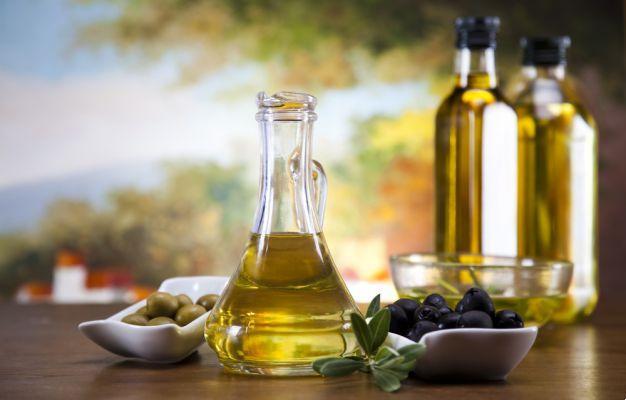
L'olive oil it is also called green gold: source of oleic acid, essential fatty acids and fat-soluble vitamins that have a positive effect on the body's lipid structure. Olive oil also has a beneficial effect on the pancreas and liver, as well as improving the general health of the nervous system. Let's take a few historical notes and some advice on the consumption of this precious elixir.
Olive oil, an elixir between history and myth
For the Greeks, oil was precious: athletes anointed themselves with olive oil before fighting hand-to-hand and the winners of the Olympics received a crown of olive branches, they obtained as a prize amphorae of oil, in addition to the hatred of the poets and inestimable respect from the citizens. Among the Phoenician and Cretan peoples, the oil had initiatory functions and it was above all light source, not only in a metaphorical sense: the diffusion of the oil lamp is due to them.
In different eras, humans have simultaneously realized how powerful and beneficial the oil was: the Egyptians thanked Isis for having introduced it, the Greeks Athena for having planted it on the acropolis and as the first meal of the day they used to consume the "acrotinos", or bread and oil dipped in wine. The Romans used it for the preparation of numerous recipes, the famous one of Horace: a slice cake with oil, cheese, flour and honey.
Advice on oil consumption
Let's proceed with some tips on olive oil and some recommendations on choice, use and storage.
Advice on choosing the type of olive oil
Olive oil is divided into extra virgin olive oil, or virgin olive oil whose free acidity expressed in oleic acid is at most 0,8 g per 100 grams (0,8%) and with a number of peroxides less than 20 (meq. O2 / Kg. Oil); virgin olive oil (the term "fino" can be used in the production and wholesale phase), whose organoleptic score is equal to or greater than 5,5, and whose free acidity is a maximum of 2 g per 100 grams (2 %) and with a number of peroxides less than 20; lampante virgin olive oil: virgin olive oil whose organoleptic score is less than 3,50, and / or whose free acidity is greater than 2 g per 100 grams (3,3%) and with a number of peroxides greater than 20.
You can learn more about all the uses and properties of olive oil
Advice on conservation
Extra virgin olive oil must be stored in tightly closed glass containers away from sources of light and heat. Like all food products, it must be consumed within the recommended expiry date, exceeding the preferable consumption date does not cause damage to health but the product loses aroma and can go rancid.
Advice on use
Whether it is harmonious, fruity, characterized by hints of almond, artichoke and ripe fruit, the oil goes very well with salads, soups, soups, Tuscan ribollita, panzanella and many first or second courses.
L'extra virgin olive oil it is always to be preferred in all hot preparations, including frying, because it is more resistant to high temperatures and richer in antioxidants. Between olive oil andseed oil the difference is not in the caloric intake: both oils in fact provide 9 Kcal for each gram of ingested substance. However, with the same calorific value, the flavor is distinctly different.
In the case of extra virgin olive oil it may happen that fragments of fruit initially in suspension are deposited on the bottom of the bottle, a typical phenomenon of the unfiltered product. In this case it is advisable to decant it because the fragments of olives, which also enrich it with taste and aroma, can ferment and alter the organoleptic characteristics. Unlike what happens for wine that can enjoy aging, extra virgin olive oil is preferable new because time plays against its properties.
Olive oil is also good for frying. Discover viable alternatives
| Foodista


























